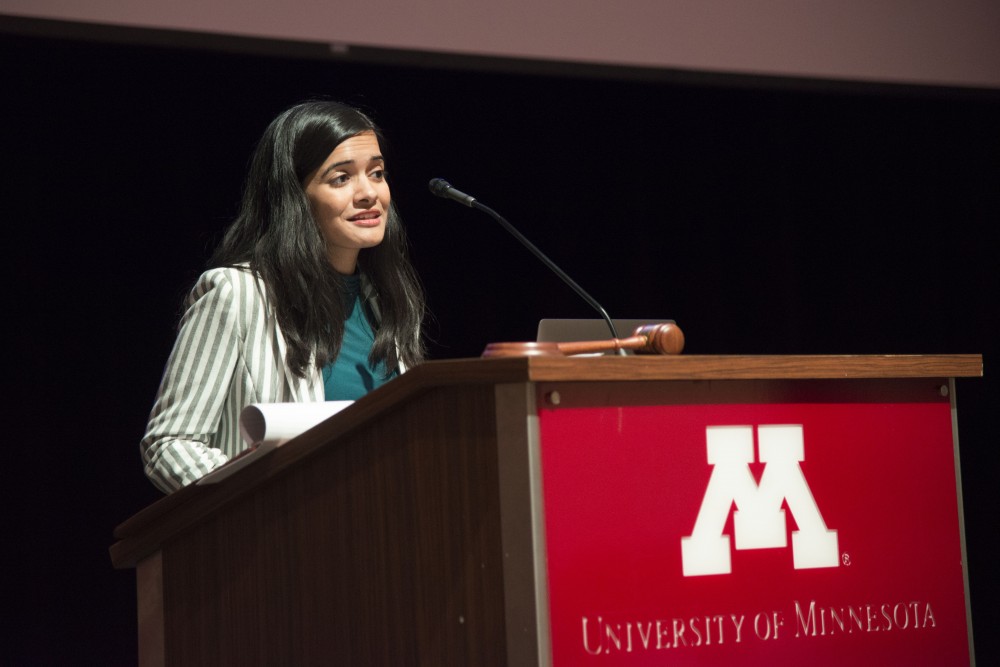The Minnesota Student Association will push last year’s priorities at the Capitol during the upcoming session, but this time under new legislative and student leadership.
Student government leaders will work to reintroduce a bill that establishes medical amnesty for victims of sexual assault along with a renters’ rights bill. This spring, MSA will look to new legislative leadership to pass these bills, which failed to pass last session. During last session, the University of Minnesota implemented a sexual harassment policy with a medical amnesty clause, similar to the bill MSA is pushing for.
“I think the primary factor in those not working out last year was just timing,” said Jude Goossens, MSA government and legislative affairs state coordinator. “Because of the nature of this advocacy work, it takes years often to get legislation passed, especially when it comes from students and organizations like ours.”
The renters’ rights bill passed unanimously in the Senate last session. However, it never made it to the House floor. The bill would have prevented landlords from making tenants move out early and would require prospective tenants be shown the exact unit they are looking to move into.
MSA learned from the past session, said MSA President Simran Mishra. She said the language in the bill’s new version will be more effective.
“We learned a lot from trying to pass a lot of legislation last year, and this year we’re hoping that with a lot of bipartisan support from both sides … we’re in a good place,” Mishra said.
The medical amnesty bill would allow sexual assault survivors to call for medical help when underage drinking or substance use is involved without fear of legal repercussions.
The University implemented a medical amnesty for sexual assault victims and substance users clause in its sexual harassment policy in January 2018, said Emma Bauer, a University spokesperson.
“Individuals who participate in an investigation under this policy will not be disciplined by the University for violations of its drug and alcohol policies that occurred in connection with the reporter prohibited conduct and were discovered as a result of a prohibited conduct report or investigation,” the policy states.
Although medical amnesty for sexual assault victims is University policy, MSA is still pushing for a bill on the issue.
“To my knowledge, there hasn’t been a specific communication to students regarding medical amnesty in this policy. … Medical amnesty is an important issue, and we’ll continue to be mindful of the topic as we communicate to the University community,” Bauer said in an email.
MSA Government and Legislative Affairs advocate development coordinator Christina Laridaen said increased awareness and political rhetoric about sexual assault will help the bill go further this session.
“A stronger case at the Legislature is the hope,” Laridaen said. “As far as MSA goes, we’ve made conversations around sexual assault [stronger] this year.”
These conversations stem from MSA’s sexual assault task force and increased advertising of their initiatives. Laridaen hopes these efforts result in more students advocating for these bills at the Capitol.
New legislative leadership will also play a role in MSA’s success at the Capitol, members said.
Newly elected House 60B Rep. Mohamud Noor, along with other state lawmakers, has been present on campus since his election in November. Both Noor and MSA members said they look forward to a continued partnership between the school and State government.
“There are tens of thousands of us students in his district and his constituency, and he’s already been valuing that and that’s really great to see,” Goossens said.
MSA members have orchestrated events to get legislators to interact with students this semester, which Mishra said will help MSA make a case for their priorities this spring.
“These are seeds that we’re planting early on, before the legislative session begins, and we had a lot of conversations last year as well,” Mishra said. “We’re hoping that these will snowball into really unifying support, and that eases into passing legislation.”
Michelle Griffith contributed to this report.








